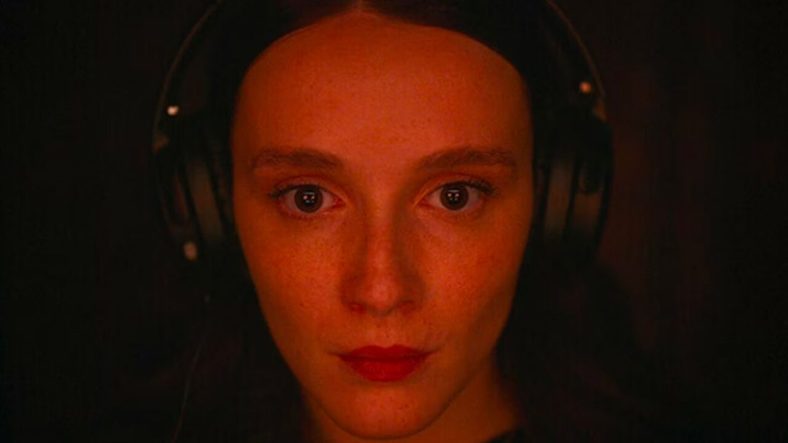‘Red Rooms’ London Film Festival 2023 Review: Digital Horror At Its Finest

The belief that pre-modern cultures thought having your photo taken would capture a part of your soul is well-known but largely historically unverified. Still, you can find it in pretty much every film about cameras and images, and it’s been rigorously updated throughout cinema’s digital age. But now we have Red Rooms, a French-Canadian psychothriller that announces itself with an operatic score and a propulsive, knotty tension, which three months after its Karlovy Vary Festival premiere already feels like a definitive update to the legend of the photograph.
Red Rooms centers on a very difficult (and public) triple murder trial in Montreal, where Ludovic Chevalier (Maxwell McCabe-Lokos) is being tried for abducting, torturing, and killing three teenage girls while streaming it all for unseen bidders on the dark web. The case seems open and shut, were it not for the fact that the retrieved live streams don’t concretely pin the crime on Chevalier—and the recording of the third missing girl has yet to be discovered.
Enter black hat hacker and model Kelly-Anne (Juliette Gariépy), who is fixated on Chevalier’s trial, sleeping outside the courtroom every night to guarantee a seat in the clinical, whitewashed courtroom. As the judge, prosecution, and defense attorneys acknowledge, this is an extremely emotionally charged case—three blond-haired, blue-eyed teenage girls have been sadistically murdered in a way that seems designed to provoke mass panic and outrage.
Also Read: ‘The Fall Of The House Of Usher’ Review: Mike Flanagan At His Most Cynical
The internet is scary, and a nest of malevolent succubi has used it (via Bitcoin) to do all sorts of unsavory deeds. But apart from Chevalier, the other person who seems visibly unmoved by the crimes is Kelly-Anne, who feels both drained of emotion and also exists as an exposed, raw nerve. There’s a connection between Kelly-Anne and Chevalier that is undisclosed for the entirety of Red Rooms’ runtime, and while this withholding of information initially frustrates, it soon leads to tantalizing unease. What could motivate someone desensitized to violence to fixate on such brutality?
Red Rooms is about digital anonymity, numbing ourselves to the barbarities of the human condition, and what really happens, deep down inside us, when we watch and are reminded of terrible violence. It’s not a didactic or overly moralistic tale. In fact, it’s difficult to shake how intimately Pascal Plante’s film whispers into your ear, and how unafraid it is of confronting how violence has been supercharged in the internet age. If cameras and screens can capture a little bit of our soul, Red Rooms asks, what kind of person would give it up willingly?
The films it reminds us of, visually and thematically, are clear: Fincher, late-stage Verhoeven, early Cronenberg, Brandon Cronenberg, not to mention Demonlover, Mr Robot, Resurrection… the list goes on. But Red Rooms easily hurdles comparisons to other works in part because it feels so urgent. The internet isn’t evil—it’s a tool. But in a world where ultraviolence can be auctioned like rare art, surely cold, unfeeling machinery bears some moral responsibility, too.
Also Read: ‘The Puppetman’ Review: A Film That’s Most Effective in Its Final Moments
Such an idea also extends to Kelly-Anne, our antihero crusader who’s whittled herself down to a sharp implement in her hunt for justice. She seems fused to Chevalier. The moment when they first make eye contact is confronting, electric, and just like the orchestral and choral score, ear-shattering. Maybe because, unlike public opinion in the courts and the media, they are now branded with finding all this sick violence mundane.
Most of Kelly-Anne’s strange vocation is drawn out by Clementine (Laurie Babin), an outwardly obsessed follower of Chevalier who’s convinced of his innocence after learning of the case online. Kelly-Anne looks upon the skittish, unstable woman with sympathy and morbid curiosity, taking her under her wing like a little project. With Clem, we see some of the few signs of positive, healthy emotions from the gambling-addicted model. Thankfully, Kelly-Anne has a whole host of deeply troubling behaviors to even it out.
Also Read: ‘Last Straw’ Beyond Fest 2023 Review: A Stylish Look At The Worst Day Of Someone’s Life
Clem’s character arc is more clearly defined than Kelly-Anne’s; her disillusionment with her cause, aided by Kelly-Anne’s attention, support, and stern words, promises to leave her in a more stable place, which Kelly-Anne cannot even guarantee for herself. By the time Kelly-Anne gets what she wants, she may be entirely lost. She makes no appearance in the film’s final scene which wraps up multiple plot threads. It feels like Kelly-Anne can only make a positive impact on others, even if it further degrades her in the process.
It’s melancholy but sickly fascinating, and often you find yourself leaning forward in your chair, studying Kelly-Anne with frazzled eyes just like how she treats her computer screens. Some strange transaction happens whenever we willingly seek out violence online, one we don’t know the details of and therefore cannot fairly agree to the terms. Red Rooms puzzles over the human cost of such a trade, wisely not trying to define it, but instead indulging us in a sick curiosity. After all, what’s more human than making yourself feel inhuman?
Summary
Reminiscent of late Verhoeven and early Cronenberg, ‘Red Rooms’ is a terrifying and propulsive look at ultra-violence in the digital age.
Categorized:Reviews

